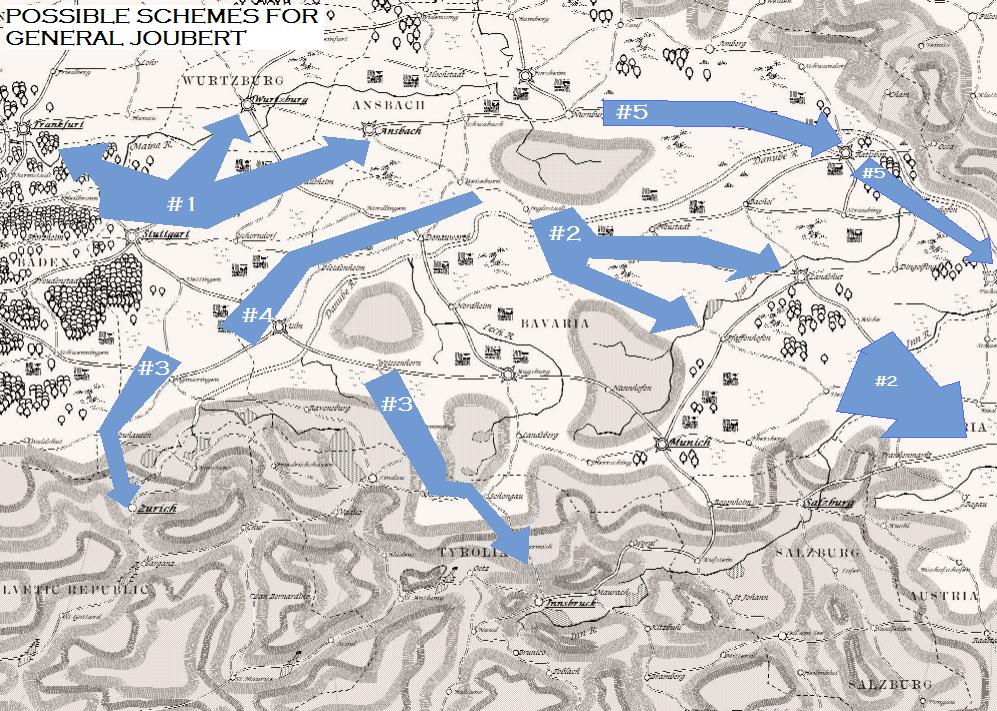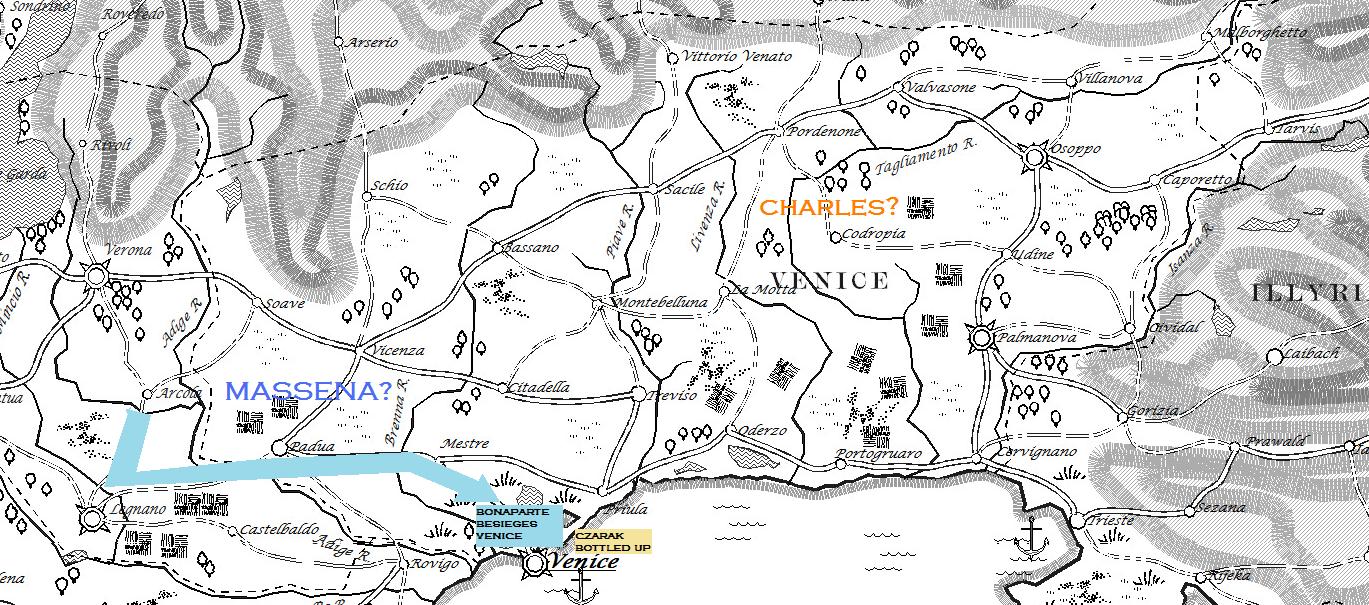 |
|
 |
THE ARRIVAL OF SPRING
Feb 24-Mar 9th, 1800
 |
|
 |
The expected major battle did not occur and the armies of both sides continue to manoeuvre cautiously, sluggishly. Spring has arrived in Europe but this has not yet apparently filled our commanders with renewed energies. The treaty that is on the table is little more than an armistice but it may be the case that the armies are trying to get to the peace without engaging in anything risky.
BAVARIA
In the North, Archduke Louis marched Alvinzi's column out of Salzburg and initiated the siege of Munich on the 23rd of February. He also sent reconnaissance elements to Augsburg but these were driven off by the arrival of Joubert's vanguard. Getting word of the approach of the French, General Hiller sent the bulk of his forces to join the siege at Munich so that when the leading elements of Joubert arrived at Munich, they could do little more than fight their way to join the defenders of that siege.
The expected mass attack of Joubert on Munich never came to pass though and he withdrew. Hiller and Alvinzi were left to continue the siege of Munich unmolested and no thought was seemingly given to the prospect of pursuing Joubert.
More than a week has passed since that encounter though it is now March 9th with the Austrians having no hint of where Joubert's army might be.

What General Joubert has planned is anybody's guess. The Austrians, by being locked down at Munich, have surrendered the initiative to him. Will he take advantage?
This student of the campaign sees five possible schemes for Joubert:
#1: If the Austrians are not going to fight, then the French might seize the opportunity to take possession of two or three minor neutral nations that are within their grasp. Hesse-Darmstadt would be a great province for France. Wurtzburg represents little more than political capital, as would Ansbach. It should be noted that Ansbach is a province of Prussia so an overly-aggressive Joubert using a variant of this scheme might bring Prussia into the war.
#2: An attack across the Isar while the Austrians are fixed at Munich would put Joubert astride the Austrian line of communications. Of course, that also opens himself up for being cut off. The road to Vienna would be open if Landshut was captured by Joubert.
#3: A two pronged, aggressive assault in the south could try to retake Helvetic Republic and take the Tyrol. Archduke Louis is still stretched to defend against this option but at best, they could delay determined French attacks. This has the disadvantage that should Munich fall and so free up the Austrians, Joubert would be horribly out of position for anything.
#4: Simply hold at the line of the Danube. If Bonaparte and Massena are winning in Italy, Joubert does not need to over extend himself in Germany. All he needs to do is occupy Louis an Hiller so that they can do nothing in aid of Charles in the south. The fortresses of Ulm and Stuttgart make this option seem fairly safe.
#5: An attack down the Danube. By swinging to the far left, Joubert might gain 3-4 days march on Hiller and make a drive on Vienna that could secure his line of communication with fortresses and force the Austrians to fall back so that they won't have time to threaten his flank. The principal flaw with this plan is that the fortresses of Ratisbon and Passau, if currently garrisoned by the Austrians, could inconvenience such an advance.
Since it was General Joubert that proposed the current treaty under consideration, option #4 seems the most practical to adopt as he waits out the ratification of the treaty.

VENICE
Following the Battle at Soave, Bonaparte fell back on Mantua and Legnano briefly, then shifted north to take Verona, and then marched decisively to Venice. Czarak, meanwhile, had continued their march down from Innsbruck to Venice and took up garrison duties in the decidedly sea-level city. 70,000 French are laying siege to 50,000 Austrians. There are too many troops there for Bonaparte to mask and move on from so he is obliged to wait, at least until his army has recovered fully.
With Bonaparte locked down at Venice, Massena must step up to assume offensive duties for the French. As yet though, the Austrians have seen no sign of his presence. It is assumed that he will advance either up the northern route through Bassano and Sacile or the southern route via Oderzo. The southern option has little to recommend it.
The French have made half-hearted reconnaissance efforts toward Trent but thus far it seems that they have no intention of reinvesting in the alps.
As for Archduke Charles, his army was so mauled after Soave that he had to retreat back toward his depot at Klagenfurt to replenish his forces. There was some happy surprise at the lack of pursuit and that might have encouraged him. Awkwardly, Czarak's trapped Salzburg column represents nearly a third of Charles' forces so he advances, anticipating an encounter with Massena each day, knowing that he must relieve Venice as an important part of the campaign but also dare not risk encountering Massena and Bonaparte together.

The treaty on the table will be ratified on March 14th unless the situation changes.